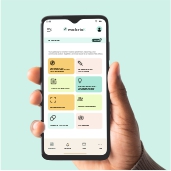Case Reporting
Case Reporting
Case reporting is one of the most critical pillars of malaria prevention and response because it provides the immediate visibility needed to detect infections early and save lives. Malaria is a fast-moving disease, and the sooner a case is reported, the sooner treatment can begin and the fewer people are exposed. The Case Reporting program within MalariaX ensures that communities, volunteers, and health workers can document symptoms and confirmed cases quickly and accurately, transforming malaria control from reactive to proactive.
Through the MalariaX platform, users can report suspected malaria symptoms, confirmed test results, or household concerns directly from their mobile devices. This eliminates delays associated with paper forms, long clinic queues, or slow communication. As soon as a report is submitted, health teams gain real-time visibility into possible outbreaks. Early detection allows for immediate follow-up, such as testing nearby households, providing treatment guidance, or mobilizing volunteers to educate affected areas. This rapid response is essential in high-risk communities where delayed action can lead to severe illness or death.
Case reporting also strengthens the accuracy of national malaria data. When reports come directly from community members and health workers, the information reflects real community conditions rather than limited snapshots collected at clinics. This creates a richer and more complete understanding of malaria trends. Programme managers can identify hotspots, track patterns, and analyze how malaria behaves in different environments. This kind of data is invaluable for planning stronger interventions, deploying resources, and guiding policy decisions.
Another key advantage of the Case Reporting program is community empowerment. When people know they can report symptoms easily and receive guidance quickly, they become active participants in malaria control. Families no longer feel disconnected from health systems. Instead, they gain confidence that their reports matter and will trigger meaningful response. This builds trust and strengthens health-seeking behavior.
The program also supports follow-up care. Health workers can track reported cases, check if individuals sought treatment, and ensure no cases are overlooked. Accurate records improve patient outcomes and prevent untreated infections from silently spreading across households.
Ultimately, Case Reporting serves as a bridge between communities and health systems. It transforms local knowledge into action and ensures that no case goes unnoticed. With faster reporting, stronger engagement, and real-time visibility, communities are better protected and malaria prevention becomes more effective.

 Our Programs
Our Programs
